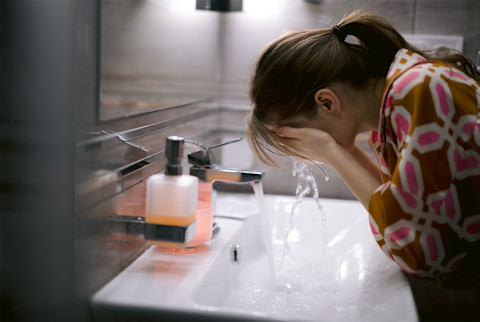Is Baking Soda Good For Your Skin? A Dermatologist Weighs In


I’m a huge advocate for simple skin care routines, and I'm an even bigger fan of natural ingredients. That being said, natural isn’t always better when it comes to skin care—the trending baking soda cleanser is one perfect example. To come, what derms truly think of this buzzy DIY venture.
Is baking soda good for your skin?
I recently came across a video of a content creator using baking soda as a cleanser, and it stopped me in my tracks. Her skin was absolutely glowing and (appeared to be) entirely wrinkle-free—she attributed those positive traits to this twice-weekly ritual.
When I further researched the topic on TikTok, I found a few dermatologists' reaction videos that answered my pressing question: Is this the simple skin care hack truly that transformative?
It turns out, not really. As board-certified dermatologist Andrea Suarez, M.D.,FAAD, explains in a response video, a DIY baking soda cleanser is not worth the risk for most people.
“I don’t recommend putting baking soda on your skin," she shares. "It’s very caustic, can disrupt your skin’s pH, leading to a lot of dryness and irritation, and can really aggravate underlying skin problems like acne and atopic dermatitis.”
Her response is just one of many anti-baking soda videos from dermatologists and estheticians on TikTok, suggesting that most people should skip this DIY hack—especially folks with sensitive complexions or inflammatory skin conditions.
Baking soda does have antibacterial properties1, which is why people may assume it's safe for acne-prone skin, but the cons outweigh the pros in this situation, as dryness and irritation will likely make acne worse.
This doesn’t mean baking soda fans are necessarily lying about their glowing skin, but research doesn’t quite seem to back up the lofty claims that it will reduce wrinkles and give you a glass-like complexion.
Even if you can tolerate baking soda on your face, Suarez says, “It still does not explain how these people look the way they do.”
See, the amount of fine lines and depth of wrinkles you have as you age has much more to do with lifestyle factors, cumulative sun exposure, and genetics, she notes. Which is why it’s much more important to focus on those research-backed contributors than test out TikTok remedies.
All of this being said, nobody knows your skin like you do. So if a baking soda cleanser works for you and you never experience irritation or dryness, then please, carry on. However, it’s important to remember that this simple ingredient won’t prevent your skin from aging, like many people claim online. And on that note, allow us to emphasize that it's OK to get wrinkles as you age—it's a natural human experience that shouldn't be stigmatized.
Better ways to encourage tighter, brighter skin
Still, we understand the allure of a glass-like complexion. It's best to stick to tried-and-true skin care steps for healthy aging, including:
- Wearing SPF daily
- Keeping your skin barrier hydrated
- Using retinol in your skin care routine
- Considering collagen supplements for additional skin-firming
- Limiting stress, smoking, and alcohol intake when possible
The takeaway
Using baking soda on your skin can cause dryness, pH imbalance, and further aggravate inflammatory skin conditions like acne and eczema. Plus, it doesn't really prevent wrinkles like some seem to think. Instead, keep your routine simple, prioritize sun protection, and use retinol if you can tolerate it. Here, more research-backed healthy skin aging tips (that don't involve DIY).